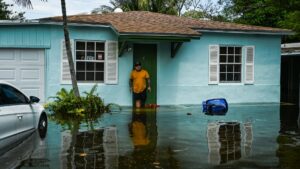Climate Change and Personal Finance: The Financial Impact of a Warming Planet
As the planet continues to warm, the financial implications are becoming more and more apparent. In fact, US weather and climate disasters cost over $617 billion between 2018 and 2022, marking a record high, according to the US Department of the Treasury. This staggering figure highlights the economic hardship that many Americans are facing due to climate change.
Experts predict that as temperatures rise and extreme weather events become more common, more people will experience financial pain. The Fifth National Climate Assessment warns that with each additional degree of warming, the US is expected to take a bigger economic hit. For example, a 2°F increase in global temperatures could double the financial impact induced by a 1°F increase in warming.
A recent report commissioned by Consumer Reports found that climate change could cost Americans born in 2024 nearly $500,000 due to higher taxes and pricier housing and food, among other factors. This highlights the significant impact that climate change can have on individuals’ wallets.
At Extreme Investor Network, we understand the importance of staying informed about how climate change can affect personal finances. That’s why we provide valuable insights and information to help you navigate the financial implications of a warming planet.
Climate change is already affecting prices in what some experts are calling “climateflation.” Household wealth is closely tied to housing, making it one of the biggest financial risks of climate change. Floods, droughts, and wildfires directly impact housing, leaving many Americans vulnerable to financial loss. For those living in disaster-prone areas, insurance premiums are rising, and coverage is being rolled back to adjust to climate risk.
Globally, insurers are feeling the impact of natural catastrophes, with losses totaling $108 billion in 2023. These costs are likely to be passed on to consumers, further exacerbating financial strain. As temperatures rise and storms intensify, the Swiss Re Institute estimates that these losses could double within the next decade.
In addition to housing and insurance, health care costs are on the rise due to fossil fuel pollution and climate change. The Natural Resources Defense Council found that health-care costs in the US related to climate change exceed $800 billion annually. The warming planet is also causing broader health effects, such as heat waves exacerbating cardiovascular events and air pollution leading to respiratory diseases and cancer.
The financial implications of climate change extend beyond housing and health care. Federal, state, and local governments may raise taxes to cover the higher costs of a hotter planet, while workers may see their wages shrink as businesses and communities are disrupted by extreme weather events. Retirement savings are also at risk, with the value of corporate stocks in portfolios being impacted by climate change.
As we face the challenges of a hotter planet, the workforce and education system are evolving to meet the new demands. Colleges are offering majors in climate change studies, and jobs in climate science are expected to grow. This shift presents an opportunity for innovation and economic growth, despite the challenges posed by climate change.
At Extreme Investor Network, we recognize the importance of understanding the financial impact of climate change. Our goal is to provide you with the information and resources you need to navigate the changing financial landscape in a warming planet. Stay informed with us as we explore what climate change means for your money, from retirement savings to insurance costs to career outlook. Join us on this journey to better understand and prepare for the financial impact of a warming planet.


